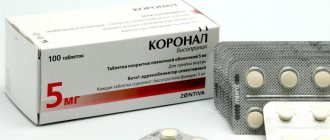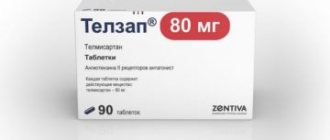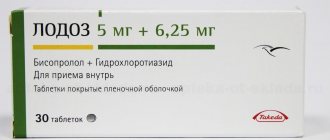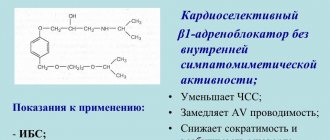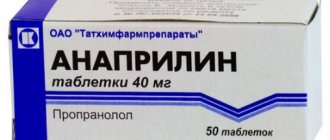Brief information about the medicine
Release form
The drug is produced in the form of tablets intended for oral administration. Round, white, scored tablets are easily identified by the engraving on the back. Depending on the dose of the active substance, the designation “B5” or “B10” is engraved on the tablet.
Each tablet is packaged in an individual blister cell. In total, the package can contain 3,6 or 9 blisters.
Another form of sale of Cordinorm tablets is in plastic jars of 100 pieces. The kit includes instructions for using Cordinorm.
Composition and active substance
The main active ingredient of the drug is bisoprolol fumarate. One tablet can contain 5 or 10 mg of the substance.
Other components included in the tablets:
- MCC;
- titanium dioxide;
- mannitol;
- sodium carboxymethylcellulose;
- hydroxypropyl methylcellulose;
- magnesium stearate;
- polyethylene glycol.
Packaging of the drug Cordinorm
pharmachologic effect
The drug has a pronounced antiarrhythmic, antihypertensive, and antianginal effect.
Manufacturer
ACTAVIS GROUP, Iceland.
Terms and conditions of storage
It is recommended to store the drug out of the reach of children at a storage temperature not exceeding 25 degrees.
The shelf life of the tablets is 2 years from the date of production. After the expiration date, the tablets cannot be used; they must be disposed of in accordance with sanitary standards.
Conditions for dispensing from a pharmacy
The drug is sold in pharmacies with a doctor's prescription.
What is the price
The price of Cordinorm tablets is 175-240 rubles per pack.
Cordinorm
Active substance:
Bisoprolol*
Pharmgroup:
Beta blockers
Average price in pharmacies
| Name | Manufacturer | average price |
| Cordinorm 0.005 n30 tablet p/film/shells | Catalent Germany Schorndorf GmbH. | 147.00 |
| Cordinorm 0.01 n30 tablet p/film/shells | Catalent Germany Schorndorf GmbH. | 199.00 |
Analogs for the active substance:Aritel Aritel Kor Bidop Biol Biprol Bisogamma Bisocard Bisomore Bisoprolol Bisoprolol-Lugal Bisoprolol-Prana Bisoprolol-ratiopharm Bisoprolol-Teva Bisoprolol hemifumarate Bisoprolol fumarate Concor Concor Cor Corbis Coronal Niperten | Application area:Heberden's disease Sudden increase in blood pressure Hypertensive circulatory disorder Hypertensive state Hypertensive crises Hypertension Arterial hypertension Hypertension is malignant Essential hypertension Hypertonic disease Hypertensive crises Hypertensive crisis Angina pectoris Malignant hypertension Malignant hypertension Malignant hypertension Isolated systolic hypertension Isolated systolic hypertension Hypertensive crisis Hypertensive crisis Exacerbation of hypertension Primary arterial hypertension Angina attack Renovascular diseases Recurrent angina Spontaneous angina Stable angina Angina syndrome X Angina pectoris Angina (attack) Angina pectoris Angina at rest Angina pectoris progressive Mixed angina Angina pectoris spontaneous Angina pectoris stable Transient arterial hypertension Chronic stable angina Essential arterial hypertension Essential arterial hypertension Essential hypertension Essential hypertension |
Pharmacodynamics: effect on blood pressure
The drug belongs to the pharmacological group of beta-blockers. The tablets inhibit beta-adrenergic receptors in the heart muscle, reducing the production of cyclic adenosine monophosphates from adenosine triphosphates. The drug reduces the movement of calcium through cellular channels, reduces atrioventricular conduction, and reduces the conductivity and excitability of the heart muscle. As a result of the action of the tablet, the myocardium needs a reduced amount of oxygen, the risk of hypoxia is reduced, and the heart receives a reduced load when pumping blood during periods of rest or activity.
The drug is active throughout the day after administration, increasing vascular resistance. 2-3 days after taking the tablet, vascular resistance returns to primary values. With prolonged use of the medication, OPSS decreases.
Cordinorm lowers blood pressure, normalizes heart rhythm, and reduces the likelihood of developing angina.
The medicine acts according to the scheme of beta-blockers
The antihypertensive effect is associated with a decrease in circulating blood volume, a decrease in the action of the renin-angiotensin-aldosterone system, an increase in peripheral vascular resistance, and normalization of internal blood circulation. The hypotensive effect appears 2-6 days after the start of therapy. The patient's condition stabilizes within 2 months after the start of treatment.
The antiarrhythmic effect is associated with the removal of factors affecting the heart rhythm. The tablets slow down atrioventricular conduction and reduce the speed of pacemaker propagation.
The antianginal effect is associated with a decrease in myocardial oxygen demand. The tablets reduce the heart rate, reduce the contractility of the heart, improve blood supply to the tissues of the heart muscle, and lengthen diastole.
The drug does not have a strong negative effect on the musculoskeletal system, muscles, uterus, arteries, pancreas, bronchi. The tablets do not lead to the accumulation of sodium and do not interfere with carbohydrate metabolism.
Pharmacokinetics of the drug
Cordinorm tablets are intended for oral administration. After consumption, the tablet enters the stomach, where it dissolves under the action of gastric juice. Bioavailability is 90%. Eating does not affect the absorption of the drug. The maximum concentration in the blood is reached 2-3 hours after administration.
Binding to blood proteins is 35-40%. The components of the drug practically do not penetrate into breast milk, through the placental and blood-brain barriers.
Metabolites are formed in the liver. The half-life is 12 hours. about 98% of the components are excreted in the urine.
pharmachologic effect
According to the instructions, Cordinorm helps to block β1-adrenergic receptors of the heart in small doses, which reduces the formation of cAMP from ATP, which stimulates catecholamines, and also reduces the flow of calcium ions inside the cells. Thanks to the influence of bisoprolol, the myocardium reduces the need for oxygen. The active substance, in addition, has negative bathmo-, dromo-, chrono- and inotropic effects, helps suppress excitability and conductivity, and slow down AV conduction. There is also a decrease in heart rate at rest and during exercise. Cordinorm has antiarrhythmic, hypotensive and antianginal effects. Under its influence, the activity of blood plasma renin decreases.
With an increase in the dose of bisoprolol, a beta2-adrenergic blocking effect appears.
The use of Cordinorm on the first day may contribute to a slight increase in OPSS, which occurs due to a reciprocal increase in the activity of α-adrenergic receptors and the elimination of stimulation of β2-adrenergic receptors. The return of OPSS to the initial level occurs after one to three days, and with prolonged use of the drug it decreases.
According to the instructions, Cordinorm has a hypotensive effect due to the activity of the renin-angiotensin system and a decrease in blood volume, as well as stimulation of peripheral vessels. This is an important indicator for patients who suffer from baseline renin hypersecretion.
Bisoprolol in Cordinorm has an antiarrhythmic effect due to the elimination of arrhythmogenic factors, including tachycardia, increased activity of the sympathetic nervous system, arterial hypertension, and increased cAMP content.
The antianginal effect of Cordinorm is due to a decrease in myocardial oxygen demand due to a decrease in heart rate and decreased contractility, improved perfusion and prolongation of myocardial diastole.
Bisoprolol (in medium doses) does not have such a clear effect on organs containing β2-adrenergic receptors: the pancreas, bronchi, smooth muscles, peripheral arteries, uterus and skeletal muscle tissue. In average doses, bisoprolol does not have a particular effect on carbohydrate metabolism and does not interfere with the removal of sodium from the body.
At high doses of bisoprolol, both subtypes of β-adrenergic receptors are blocked.
In the gastrointestinal tract, bisoprolol is absorbed by 80-90%. According to the instructions for Cordinorm, consuming it simultaneously with food does not affect the absorption of the drug. The active substance reaches its maximum concentration in the blood after one to three hours.
About 35 percent of bisoprolol is bound to plasma proteins. The substance almost does not pass into breast milk and does not penetrate the placenta.
After metabolization in the liver, 1/2 of the taken Cordinorm is converted into inactive metabolites, the second half is excreted unchanged by the body.
When use is contraindicated
Contraindications to the use of Cordinorm tablets:
- collapse;
- acute heart failure;
- atrioventricular block of 2 degrees and higher;
- variant angina;
- state of shock;
- Raynaud's syndrome;
- pulmonary edema;
- sinus node failure;
- violation of acid-base balance;
- sinus node dysfunction;
- severe disturbance of sinus rhythm;
- cardiac hypertrophy;
- low blood pressure;
- simultaneous use of monoamine oxidase inhibitors;
- bronchial asthma;
- COPD;
- changes in peripheral blood circulation and microcirculation;
- pheochromocytoma;
- children under 18 years of age.
You should take the medication with caution if you have muscle weakness, impaired liver or kidney function, diabetes, hyperthyroidism, 1st degree atrioventricular block, psoriasis, depression, or old age.
Contraindications to the use of Cordinorm
Cordinorm is contraindicated for:
• shock (including cardiogenic);
• collapse;
• pulmonary edema;
• chronic heart failure in the stage of decompensation;
• acute heart failure;
• sinoatrial block;
• AV blockade II-III degree (without pacemaker);
• SSSU;
• severe bradycardia (heart rate less than 50 beats per minute);
• cardiomegaly (without signs of heart failure);
• Prinzmetal's angina;
• arterial hypotension (systolic blood pressure less than 100 mm Hg, especially with myocardial infarction);
• history of bronchial asthma and COPD;
• late stages of peripheral circulatory disorders;
• simultaneous use of MAO inhibitors (exception – MAO type B);
• Raynaud's disease;
• metabolic acidosis;
• pheochromocytoma (without joint use of alpha-blockers);
• hypersensitivity to other beta-blockers;
• hypersensitivity to any other component of the drug;
• children and adolescents under 18 years of age (safety and effectiveness have not been established).
Cordinorm should be used with caution by those who have liver failure, chronic renal failure, myasthenia gravis, thyrotoxicosis, diabetes mellitus, depression (including a history), psoriasis, old age
Instructions for use and dosage
The tablets are intended for oral administration. If you have high blood pressure, you should drink Cordinorm whole, with a sufficient amount of water. Doctors recommend taking Cordinorm in the morning before meals.
The recommended daily dose is 2.5-5 mg. The doctor may gradually increase the dosage to 10 mg. The maximum daily dosage should not be higher than 20 mg.
No dose adjustment is required if hepatic or renal function changes. In severe renal failure, the maximum dose should not exceed 10 mg.
Elderly patients can take the drug in the same dosage as other categories of patients.
Which is better: Cordinorm or Concor?
Cordinorm for lowering blood pressure or Concor are two drugs that have a lasting therapeutic effect, which is better can only be determined through experiment. Both drugs cope with their tasks equally well, since they contain the same substance - bisoprolol. You can select the appropriate drug for a particular patient, taking into account his individual characteristics and checking the instructions for use.
Concor is 30–40% more expensive, depending on the number of tablets in the pack. In addition, Cordinorm is available in 90 tablets - this makes it possible to save money by buying a larger package.
special instructions
Cordinorm should not be used for blood pressure without a doctor's prescription. Do not abruptly stop medication therapy or change the dosage without consulting your doctor.
When taking a course of medication for blood pressure, it is necessary to monitor heart indicators, including heart rate and pressure, and check the condition of the heart using an electrocardiogram. Diabetics need to have their blood glucose tested every four months. In old age, a study is carried out every 4 months to determine the condition of the kidneys.
If lung function is impaired, it is necessary to check the condition of the respiratory system to exclude respiratory failure.
The drug Cordinorm may be ineffective for angina pectoris; the absence of a therapeutic effect is observed in 20% of cases.
The effect of a drug from the group of beta blockers is reduced in smokers.
When patients with pheochromocytoma take the tablets, the likelihood of developing hypertension increases.
Before the upcoming surgical intervention, you must stop taking the beta-blocker Cordinorm two days before the start of the operation. General anesthesia can increase the hypotensive effect of Cordinorm.
For inflammation of the bronchi, the doctor may prescribe Cordinorm tablets, but in a reduced dosage if other antihypertensive drugs are ineffective in treating hypertension. If the bronchi are disrupted, there is a high risk of developing bronchospasm.
You cannot continue taking the medication if you develop a depressive state caused by the use of Cordinorm.
Treatment with Cordinorm should not be abruptly interrupted, as this may lead to a heart attack or severe heart rhythm disturbances. Therapy with tablets is completed gradually, reducing the dosage over 14 days.
When taking the medication, it is recommended to refrain from driving or doing work that requires concentration in the first days, as the tablets can cause changes in psychomotor reactions.
Cordinorm can provoke and aggravate depressive conditions
Indications and restrictions
When prescribing this remedy, many patients are interested in what Cordinorm helps with. Experts advise taking it only if there are appropriate indications. Among them:
- cardiac ischemia;
- prevention of angina attacks;
- persistent increase in blood pressure (hypertension).
Properties of the drug
The drug is also prescribed as part of complex treatment of chronic heart failure (systolic dysfunction of the left ventricle) with the use of diuretics, ACE inhibitors and cardiac glycosides.
Cordinorm has some contraindications that should be taken into account before prescribing it. It is not recommended to take it in the following cases:
- individual intolerance to bisoprolol or other components;
- state of cardiogenic shock;
- cardiac collapse;
- pulmonary edema;
- decompensated heart failure;
- HF in the acute stage;
heart blocks;- weakness of the sinus node;
- decreased heart rate (bradycardia);
- spontaneous angina (caused by spasm of the coronary vessels);
- presence of pheochromocytoma;
- significant decrease in systolic blood pressure (below 100 beats);
- severe circulatory disorders in peripheral vessels;
- enlarged heart syndrome;
- pulmonary obstruction, bronchial asthma;
- increased acidity due to metabolic disorders;
- Raynaud's syndrome (vasospastic disease of small arteries).
It is prohibited to use the medicine during pregnancy, breastfeeding, or in the treatment of minors. The drug is prescribed with caution in the following conditions:
- renal or liver failure;
- 1st degree heart block;
- excess of thyroid hormones;
- myasthenia gravis;
- allergic skin lesions (for example, psoriasis);
- depressive states;
- old age.
If there are such restrictions, the patient must be constantly under the supervision of his attending physician while taking the medication. It is important to monitor cardiac activity and blood pressure.
Adverse reactions
Taking Cordinorm with high blood pressure can provoke the appearance of unwanted reactions in the body. Possible side effects:
- organs of perception: decreased tear production, impaired visual function, dry eyes, pain in the eyes, inflammation of the conjunctiva;
- nervous system: lethargy, loss of strength, fatigue, dizziness, nightmares, sleep disturbances, headaches, depression, muscle weakness, clouding of consciousness, memory impairment, causeless anxiety, asthenic syndrome, imaginary visions, sensitivity disorder, trembling of the limbs;
- cardiovascular system: increased heart rate, decreased myocardial contractility, sinus rhythm disturbance, cardiac conduction disturbance, cardiac arrhythmia, change in atrioventricular conduction, chronic heart failure, orthostatic collapse, a sharp decrease in pressure to critical values, vascular crisis, chest pain cage;
- respiratory system: respiratory failure, runny nose, involuntary contraction of the muscles of the larynx, narrowing of the lumen of the small bronchi;
- digestive system: dry mouth, abdominal pain on palpation, vomiting, difficulty defecating, loose stools, impaired taste perception, impaired liver function, increased bilirubin levels in the blood;
- endocrine system: decrease or increase in blood glucose levels, hypothyroidism;
- skin: hyperemia, psoriasis, hyperhidrosis, eczema, baldness;
- manifestations of allergies: rashes, nettle fever, itching;
- circulatory system: decreased level and number of leukocytes, decreased platelet count;
- genitourinary system: decreased libido, erectile dysfunction;
- musculoskeletal system: convulsive contractions of the calf muscles, muscle weakness, myalgia, joint pain, pain in the lumbar region;
- impact on fetal development: low blood sugar, growth retardation, sinus rhythm disturbance;
- other reactions: withdrawal reaction.
Dryness and pain in the eyes are side effects of taking pills
Drug overdose
The blood pressure medicine Cordinorm, used in violation of the prescribed dosage or duration of administration, can lead to an overdose, which is expressed in the appearance of characteristic symptoms:
- severe bradycardia;
- a sharp decrease in pressure indicators to critical values;
- ventricular extrasystoles;
- heart rhythm disturbance;
- atrioventricular block;
- chronic heart failure;
- bluish coloring of nails and hands;
- narrowing of the lumen of small bronchi;
- loss of consciousness;
- respiratory dysfunction;
- dizziness;
- convulsive seizures.
If there are signs of an overdose, it is necessary to rinse the stomach, take an adsorbent, and call a doctor. The doctor will prescribe appropriate symptomatic therapy.
Drug compatibility
Prescribing Cordinorm for high blood pressure in combination with other medications should be done with caution, as this can lead to changes in the pharmacological properties of the drugs:
- allergen-specific drugs increase the likelihood of developing an allergic reaction to bisoprolol;
- X-ray contrast agents increase the likelihood of anaphylaxis;
- general anesthesia and Phenytoin increase the risk of a sharp drop in blood pressure to critical levels;
- NSAIDs, glucocorticoids, estrogen-containing drugs reduce the antihypertensive effect;
- cardiac glycosides, calcium antagonists, antiarrhythmic drugs, Amiordan, Guanfacine, Methyldopa, Reserpine increase the likelihood of atrioventricular block, which can lead to cardiac arrest;
- Nifedipine may enhance the hypotensive effect;
- Diuretics, sympatholytic drugs, antihypertensive drugs, Hydralazine, Clonidine lead to a strong decrease in blood pressure;
- tricyclics, tetracyclics, ethyl alcohol, sedatives, antipsychotics, sleeping pills increase the effect of Bisoprolol on the nervous system;
- MAOIs enhance the hypotensive effect;
- Rifampicin reduces the half-life of Cordinorm components;
- Cordinorm reduces the therapeutic effect of antidiabetic drugs and insulin;
- Cordinorm increases the concentration of the components Lidocaine and xanthines in the blood;
- Bisoprolol increases the duration of action of non-depolarizing muscle relaxants, coumarin.
Concomitant use with diuretics can lead to a sharp decrease in blood pressure
Drug interactions
When taking bisoprolol in combination with other medicinal substances, there is a possibility of developing undesirable reactions:
- Cardiac glycosides, slow calcium channel blockers (diltiazem, verapamil), methyldopa, guanfacine, glycosides, reserpine, amiodarone and other antiarrhythmic drugs - the risk of developing/worsening bradycardia, AV block, heart failure, cardiac arrest;
- Iodine-containing X-ray contrast agents for intravenous administration – risk of anaphylactic reactions;
- Allergen extracts for skin testing and allergens used for immunotherapy – risk of severe systemic allergic reactions or anaphylaxis;
- Diuretics, sympatholytics, clonidine, hydralazine and other antihypertensive drugs – excessive decrease in blood pressure;
- Ethanol, sleeping pills, sedatives and antipsychotics, tricyclic and tetracyclic antidepressants - enhances the inhibitory effect of bisoprolol on the central nervous system;
- Ergotamine, non-hydrogenated ergot alkaloids – peripheral circulatory disorders;
- Sulfasalazine – increasing the concentration of bisoprolol in plasma;
- Lidocaine and xanthines (except diphylline) - a decrease in their clearance and an increase in plasma concentration, especially in patients with an initially increased clearance of theophylline under the influence of smoking;
- Rifampicin – reduction of the half-life of bisoprolol;
- Non-depolarizing muscle relaxants – prolongation of their action;
- Coumarins – increased anticoagulant effect;
- Phenytoin (intravenous) and agents for general inhalation anesthesia (hydrocarbon derivatives) – increased severity of cardiodepressive effects, decreased blood pressure;
- Non-steroidal anti-inflammatory drugs, glucocorticosteroids and estrogens - reducing the hypotensive effect of bisoprolol;
- Insulin and oral hypoglycemic agents – changing their effect, masking the symptoms of developing hypoglycemia;
- Monoamine oxidase inhibitors – a significant increase in the hypotensive effect.
